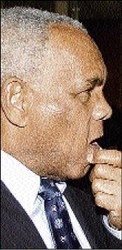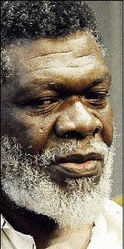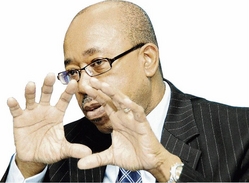


From left, Davies, Willis and Hughes
Don Robotham, Contributor
Some are inclined to dismiss the entire FINSAC enquiry as yet another diversionary circus. Credit downgrades are coming fast and furious. Junk-bond status is around the corner. The budget deficit zooms to over 10 per cent. No one knows what awaits the exchange rate. No International Monetary Fund (IMF) agreement seems able to be concluded, and crime continues to rage. A view has rapidly gained ground across all political lines that our finance minister is woefully inept and our prime minister is 'eyeless in Gaza.' So why not shift the focus elsewhere to Omar Davies?
Silent rescue
Many people suffered and continue to suffer dearly as a result of the economic meltdown of the 1990s. But there was also the silent rescue of an even greater number - over one million Jamaicans. The story and sight of Mr Mechesk Willis at the FINSAC enquiry, leaning against his crutches, his life entirely destroyed, was heart-rending. Against this has to be set the silent rescue of millions of savings accounts. Since this occurred behind the scenes, most Jamaicans are totally oblivious to this day of our narrow escape from complete disaster.
But if Davies had allowed the National Commercial Bank to go bankrupt and millions of Jamaicans to lose their life savings as the IMF recommended, and as some are now blithely suggesting, the Jamaican economy would have collapsed completely. Not only our economic system would have collapsed, but probably our political system as well. We would be singing a very different tune today - if we could sing at all.
Root problems
The root problems which produced the necessity for the high interest rate policy preceding FINSAC continue to exist today, as Wesley Hughes tried to point out to his own recalcitrant finance minister recently. The root problem was and is the gross uncompetitiveness of our real economy. In the case of FINSAC, to understand how the high interest-rate policy came about, one has to go back to the humongous 1991 inflation, which had its root in the deregulation and liberalisation of an uncompetitive economy in 1989.
Prior to 1989, imports to the Jamaican economy were still highly regulated, with exchange controls in place, basic food subsidies widespread, and an exchange rate which was administered. The result was, as some may recall, access to foreign exchange by the general public, as well as by firms, was tightly controlled by government, with travellers limited to very small amounts upon application to the bank.
But all this changed abruptly in 1989 after the second Michael Manley government was elected. Almost immediately, steps were taken to deregulate and liberalise the economy, the first of which involved the removal of subsidies from basic food items early in 1989. The following then ensued, according to the Economic and Social Survey of 1989:
"Towards the end of the first half of 1989, the surge in private-sector demand for credit began to spill over into higher-than-targeted levels of imports. Total credit to the private sector expanded during the review year by $1,410.2 million, or 28.8 per cent, significantly higher than the annual average increase of $827.7 million for the years 1986, 1987 and 1988. Commercial bank credit expanded by an unprecedented $1,690.0 million, compared with an increase of $870.1 million in 1988.
"The strong credit growth and the consequent widening in the current-account deficit served to put pressure on the exchange rate, triggering a series of devaluations of the Jamaican dollar. The credit fuelled growth in foreign-exchange demand for the review period outpaced the increase in both commercial bank purchases of foreign exchange, and the increase in foreign exchange supplied to the auction. While total foreign-exchange demand grew by US$233.7 million in 1989, total purchases and total auction supply grew at the slower pace of US$1.1 million and US$199.3 million, respectively. This resulted in a considerable increase in the 'overhang' at the end of the year."
Overhasty deregulation
As a result of this, in my opinion, overhasty deregulation and liberalisation, the inflation rate jumped to 17 per cent, and the exchange rate was devalued by 15.4 per cent. But this was only the beginning. A spate of devaluations followed, culminating in the horrendous 1991 inflation. To quote the Economic and Social Survey of 1992:
"The Consumer Price Index (CPI) moved from 299.3 points at the end of December 1991 to 419.6 points at the end of December 1992. The result of this was a point-to-point inflation rate of 40.2 per cent. For the similar period of 1991, the inflation rate was 80.2 per cent. The average rate of inflation at the end of the calendar year 1992 was 77.3 per cent compared with 51.0 per cent at the end of 1991."
Liberalisation Without Reserves
Jamaica had liberalised an economy which was (and still is) grossly uncompetitive and therefore with huge deficits in both its foreign and domestic accounts. The reality of these deficits (the accounting expression of our uncompetitiveness) made the ensuing inflation and devaluations absolutely inevitable. This was the reality in 1989 and it is still the reality 20 years later in 2009.
Omar Davies was not the finance minister either in 1989 or in 1991-92. Yet when he did become finance minister, he was called upon to tame this horrendous inflation and to manage our basket case in an unforgiving global environment. He had either to pursue a high interest-rate policy, or a very drastic deficit-reduction policy. He chose a mixture of the two, with the emphasis leaning towards high interest-rate policy. He achieved the remarkable result of preventing the total meltdown of our financial system, saving over one million account holders in the process. He went further and built up a huge reserve of nearly US$1.9 billion in foreign exchange from what was a negative amount in 1988. He did not achieve much economic growth. But how much can one mortal do? As Wesley Hughes has pointed out, in Jamaica, lack of growth has little to do with a high interest-rate policy.
Different policy mix
Two things are vital to note here. Whether Dr Davies or any other finance minister had chosen a different policy mix - for example, one of dramatically cutting the budget deficit as is being advocated by some today - a similar FINSAC-type hardship would have ensued. Both policies - high interest rates and deep budget cuts - have the same policy aim and a similar outcome: a significant reduction in local consumption. Actually, and this may sound strange, the high interest-rate policy is the more socially lenient one since it affects consumption indirectly by tightening credit, unlike a budget cut, which lays off thousands at one go. High interest rates hit the business person mainly, while the budget cuts hit the workers mainly.
The second point concerns deregulation and liberalisation. Those who wish to use the facts above to shout "Is Manley's fault!" should consider the following: In 1989, Jamaica had no choice but to deregulate and liberalise. By that time, globalisation had become the reality to which all nations - not to mention a small, open, export-dependent economy such as ours - were compelled to adapt. We still face the challenge of so adapting in 2009.
Inflation and deficits had to be contained in 1989, and they have to be contained again in 2009. Those who believe that in a globalised neo-liberal economy, one can simply decree a reduction in interest rates while running huge budget deficits, will soon discover the folly of this viewpoint, but, alas, at our country's expense. Davies had and has no such illusions. He offered no snake-oil interest-rate-reduction placebo. He administered the real bitter interest-rate medicine, for which he is now to be crucified.